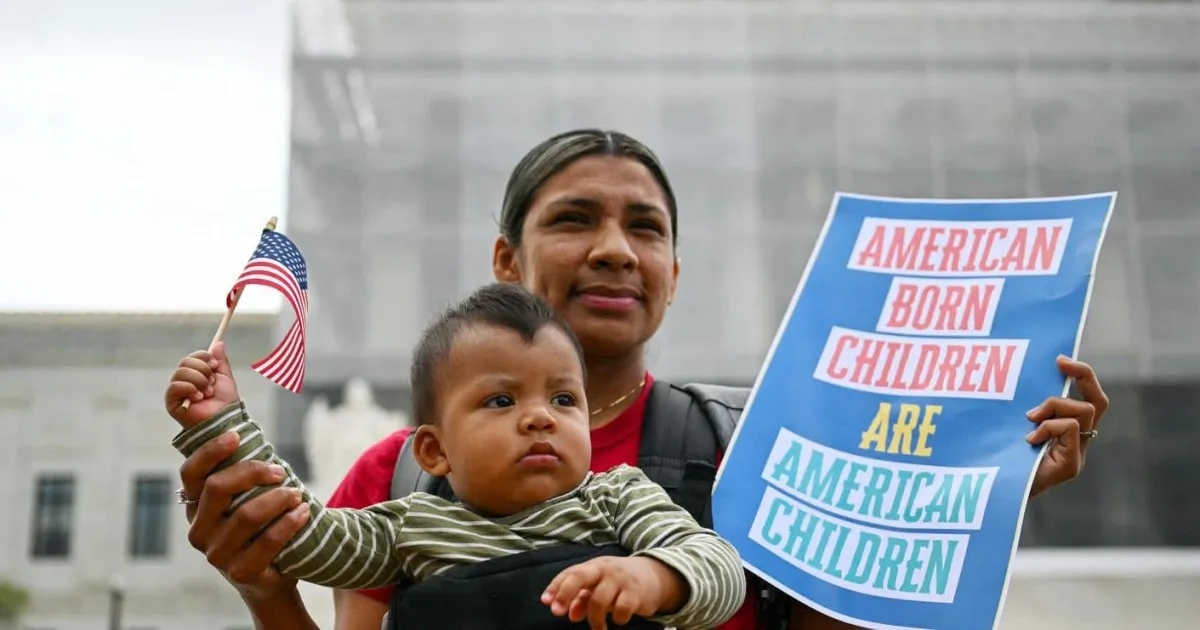
CONCORD, N.H. — A significant legal development occurred on Thursday when a federal judge in New Hampshire granted class-action status to a lawsuit aimed at protecting newborns who would be denied birthright citizenship under the Trump administration's controversial order. This ruling included a temporary injunction that prevents the president’s directive from being enforced nationwide.
The lawsuit was initiated on behalf of a pregnant immigrant and her child, alongside other immigrant parents and their infants. The plaintiffs sought class-action status to extend protection to all babies and their families across the United States who could be impacted by this executive order. During the proceedings, Cody Wofsy, the lead attorney representing the plaintiffs from the American Civil Liberties Union (ACLU), emphasized to U.S. District Judge Joseph Laplante that the plaintiffs would face irreparable harm if denied birthright citizenship, a point the judge found credible.
Judge Laplante certified class-action status specifically for the infants affected by the restrictions, while not extending it to their parents. He also granted a preliminary injunction that temporarily halts the enforcement of President Trump’s order, but stayed his ruling for seven days to allow the government time to appeal. After the hearing, Wofsy remarked, “This is going to protect every single child around the country from this lawless, unconstitutional and cruel executive order.”
Attorneys from the Department of Justice contended that the relief sought by the plaintiffs was excessively broad and questioned whether the criteria for class-action status were adequately met. They further argued that the request for both a preliminary injunction and class status was premature, seeking additional time to appeal the ruling.
During the court proceedings, Judge Laplante stated that stripping an individual of the long-standing right to birthright citizenship constituted “irreparable harm” and described birthright citizenship as “the greatest privilege that exists in the world.” The White House did not provide an immediate response to the order but had previously communicated through spokesperson Abigail Jackson that the Trump administration is focused on lawfully implementing the President's executive order to preserve the essence of American citizenship.
In a statement following the hearing, the Department of Justice referred to a prior comment made by Attorney General Pam Bondi, who labeled the ruling as an attempt by a “rogue district court judge” to bypass the Supreme Court's recent decisions against nationwide injunctions. Bondi asserted, “the American people see right through this,” and affirmed that the Department of Justice would continue to advocate for Trump’s immigration agenda.
The legal battle unfolds as the ACLU and other advocacy groups have recently filed a new wave of lawsuits seeking class-action status after the Supreme Court limited judges' power to issue nationwide injunctions. While the Supreme Court did not rule on the constitutionality of the Trump administration's birthright citizenship order, it permitted the order to take effect on July 27, pending further judicial action.
Trump's directive seeks to restrict birthright citizenship to children whose parents are either U.S. citizens or permanent residents. The order would also deny citizenship to children born to mothers who are in the U.S. temporarily, such as tourists or students, contradicting the widely accepted interpretation of the Constitution’s 14th Amendment, which guarantees citizenship to anyone born on U.S. soil, with limited exceptions.
Wofsy, deputy director of the ACLU’s Immigrants’ Rights Project, stated, “Every court to have looked at this cruel order agrees that it is unconstitutional.” He emphasized that the Supreme Court’s ruling did not suggest otherwise and reaffirmed the ACLU's commitment to ensuring that President Trump cannot infringe upon the citizenship rights of any child.
Devon Chaffee, Executive Director of the ACLU of New Hampshire, echoed these sentiments, asserting that the executive order directly contradicts the Constitution and American values. She warned that it would create a lasting, multigenerational subclass of individuals born in the U.S. who would be denied full citizenship rights. “No politician can ever decide who among those born in our country is worthy of citizenship,” Chaffee stated, vowing to fight for the rights of every child born in the United States.
Shortly after taking office, President Trump issued the executive order titled “Protecting the Meaning and Value of American Citizenship.” In response, nearly two dozen states have filed lawsuits claiming that the order violates the 14th Amendment, which clearly states, “All persons born or naturalized in the United States, and subject to the jurisdiction thereof, are citizens of the United States and of the State wherein they reside.”
The current legal landscape reflects ongoing challenges to the administration's efforts to limit birthright citizenship, as immigrant rights groups continue to mobilize against policies they view as unconstitutional and discriminatory.